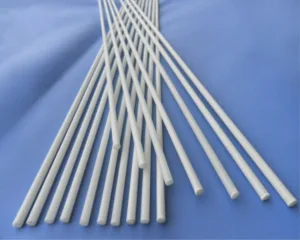Introduction
When it comes to selecting the right material for various applications, one often faces a multitude of choices. In the world of construction, fishing, and even hobbies like kite making, the choice of material for rods plays a pivotal role in determining the outcome. One such material that has gained popularity over the years is fiberglass. In this article, Unicomposite composite profiles will explore the attributes of fiberglass rod stock and compare it to other materials to help you make an informed decision about what suits your needs best.

fiberglass rod stock
What Are Fiberglass Rods?
Fiberglass rods are made from glass fibers bound together with resin. This creates a lightweight but sturdy material with a range of applications. They have gained popularity for their versatility and strength, making them a reliable choice for various industries.
Other Materials Used in Rod Manufacturing
- Steel: Steel rods are known for their exceptional strength and durability, making them suitable for heavy-duty applications.
- Aluminum: Aluminum rods are lightweight and corrosion-resistant, often used in industries where weight and longevity matter.
- Carbon Fiber: Carbon fiber rods are known for their high strength-to-weight ratio, making them ideal for applications requiring extreme durability.
Strength and Durability
Fiberglass Rods: Fiberglass rods offer impressive strength and durability. They are capable of withstanding substantial stress without compromising their structural integrity.
Other Materials: Steel rods are exceptionally strong, but they may be heavier. Aluminum rods are also durable but may not match the strength of steel. Carbon fiber rods are renowned for their strength.
Weight and Flexibility
Fiberglass Rods: Fiberglass rods are relatively lightweight, making them suitable for a range of applications. They offer a balance between strength and flexibility.
Other Materials: Steel rods are heavy, which can limit their application in situations where weight is a concern. Aluminum rods are lighter, while carbon fiber rods are exceptionally light and flexible.
Cost Comparison
Fiberglass Rods: Fiberglass rods are cost-effective compared to some other materials, making them a practical choice for those on a budget.
Other Materials: Steel rods can be more expensive due to their strength. Aluminum and carbon fiber rods are usually pricier than fiberglass.
Application in Fishing
Fiberglass Rods: Fiberglass rods are popular among anglers for their flexibility and strength, allowing them to handle various fish species.
Other Materials: Steel rods are often used in deep-sea fishing due to their robustness. Aluminum and carbon fiber rods are favored for their lightweight design.
Application in Construction
Fiberglass Rods: In construction, fiberglass rods find use in reinforcing concrete structures. They provide strength without adding excessive weight.
Other Materials: Steel rods are commonly used in heavy construction due to their high strength. Aluminum rods can be used in situations where weight is a concern, and carbon fiber is preferred for specialized applications.
Maintenance and Longevity
Fiberglass Rods: Fiberglass rods require minimal maintenance and have a long lifespan, making them a practical choice for many applications.
Other Materials: Steel rods may require more maintenance to prevent corrosion. Aluminum and carbon fiber rods are generally low-maintenance.
Environmental Impact
Fiberglass rods are considered more environmentally friendly compared to steel due to their lower energy consumption during production.
Which One is Right for You?
The choice between fiberglass rod stock and other materials largely depends on your specific needs and budget. If you prioritize strength and are not concerned about weight, steel might be a good choice. For lightweight applications, aluminum and carbon fiber are viable options. Fiberglass rods strike a balance between strength, cost-effectiveness, and weight.
Pros and Cons of Fiberglass Rods
Pros:
- Affordable
- Lightweight
- Durable
- Versatile
Cons:
- Less strong than steel
- Not as lightweight as carbon fiber
Pros and Cons of Other Materials
Steel:
- Pros: Exceptionally strong
- Cons: Heavy
Aluminum:
- Pros: Lightweight
- Cons: May not match steel’s strength
Carbon Fiber:
- Pros: Extremely lightweight and strong
- Cons: Relatively expensive
Conclusion
In the world of materials for rods, fiberglass stands as a versatile and practical option, catering to a wide range of applications. Its strength, cost-effectiveness, and lightweight nature make it an attractive choice. However, for specialized applications or where strength is the utmost priority, other materials like steel, aluminum, or carbon fiber might be more suitable.
FAQs
- Are fiberglass rods suitable for heavy-duty construction?
- Fiberglass rods are often used in construction for their strength and durability. However, steel may still be preferred for extremely heavy-duty applications.
- Can fiberglass rods be used for saltwater fishing?
- Yes, fiberglass rods are suitable for saltwater fishing due to their corrosion resistance.
- Do carbon fiber rods break easily?
- Carbon fiber rods are incredibly strong and durable. They are designed to withstand considerable stress and are less likely to break.
- What is the typical lifespan of a fiberglass rod?
- With proper care and maintenance, a fiberglass rod can last for many years.
- Are aluminum rods a good choice for backpacking trips?
- Yes, aluminum rods are lightweight and are a good choice for backpacking due to their portability.




























